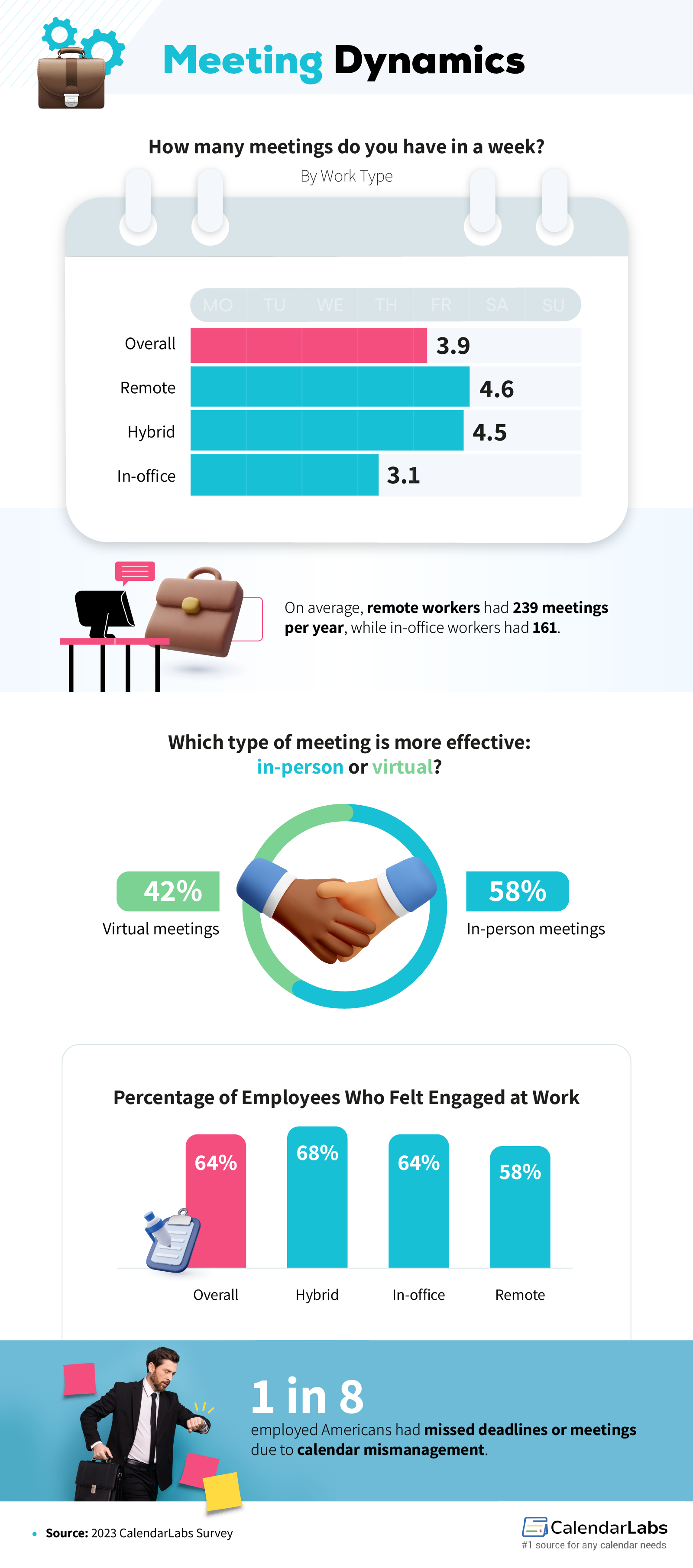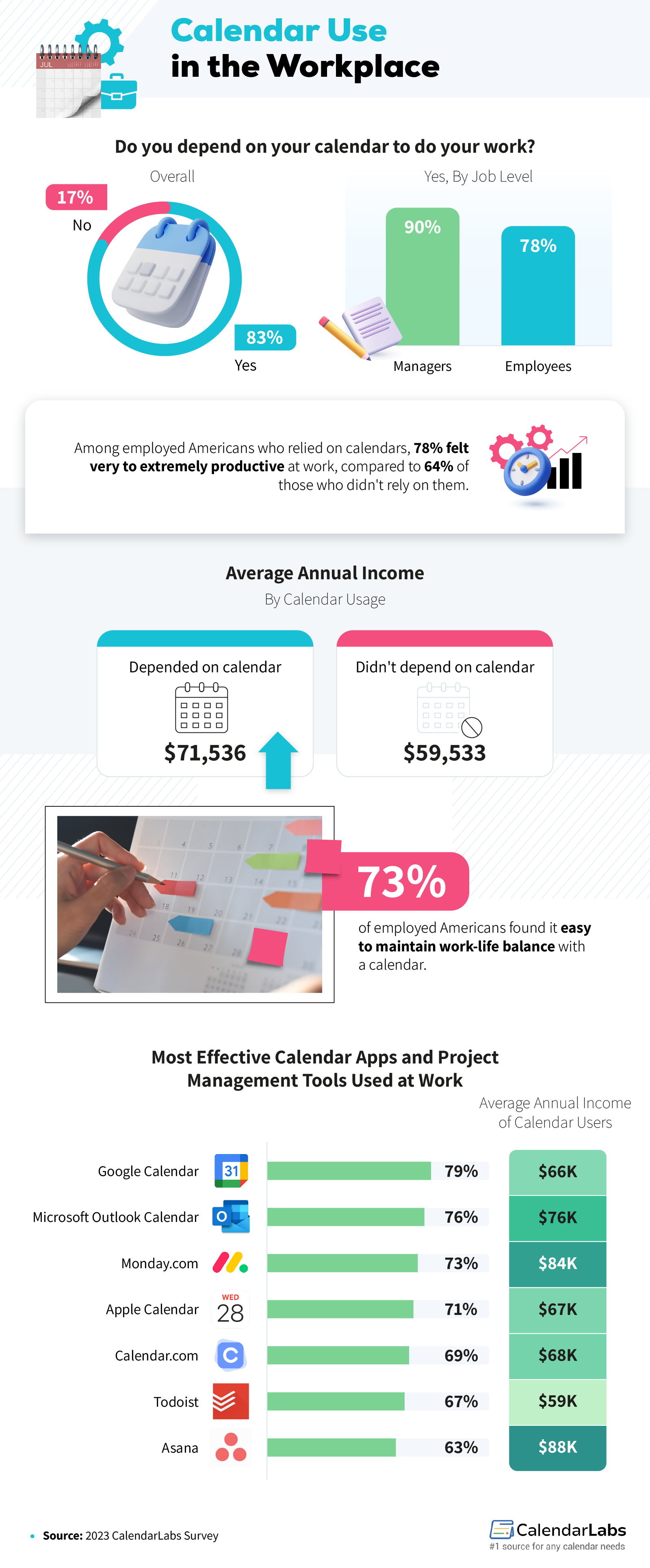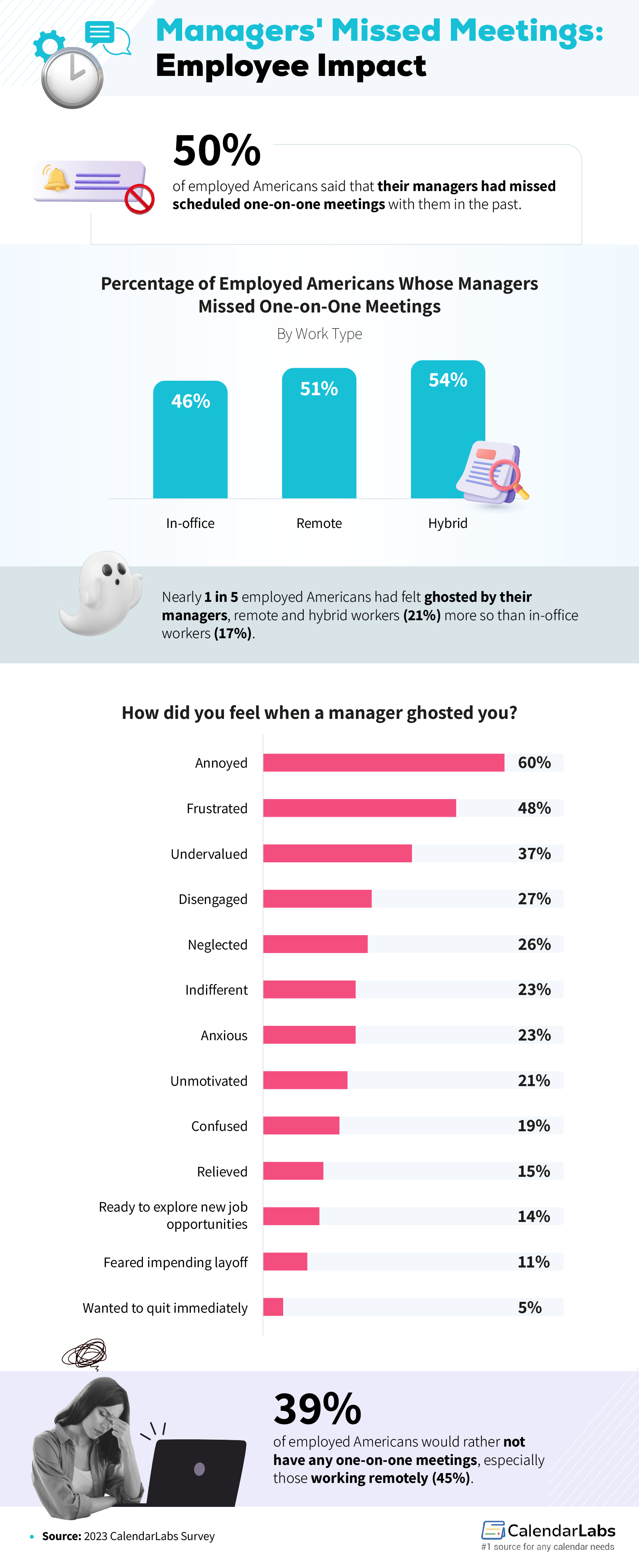
From Scheduling to Success: The Calendar's Role in Your Career
Where would we be without our work calendars? Likely, not in that meeting scheduled for later today. Calendars have become the beating heart of modern workplaces, ensuring everything runs smoothly, and everyone is in the right place at the right time. We surveyed 1,001 full-time employees working remote, in-office, or hybrid jobs to gain insight into current calendar habits. How can a calendar impact worker productivity, efficiency, and salary? Let's find out.
Key Takeaways
-
83% of employed Americans depend on a calendar to effectively manage their day-to-day workflow.
-
Remote workers averaged 239 meetings per year, while in-office workers had 161. Yet, remote workers felt less engaged at work compared to in-office workers.
-
Nearly 1 in 5 employed Americans have felt ghosted by their managers, remote and hybrid workers (21% each) more so than in-office workers (17%).
-
1 in 10 employed Americans have peeked at their boss's calendar without permission.
Meeting Overload
To begin, let's learn how many meetings are on workers' calendars and see if we can solve the ongoing debate about whether virtual or in-person is better.

Work meetings can kill productivity when they're too long or too numerous, so we thought it important to ask people about them and highlight any issues. Overall, leadership was worse off than those they managed. Surveyed managers reported an average of 229 meetings annually, while employees attended about 187.
It's interesting to note the contrast between remote and in-office employees regarding their meeting habits. On average, remote workers attended 239 meetings in the past year—a hefty 416 hours. In-office workers had an average of 161 meetings, clocking in about 338 hours. Despite fewer meeting hours, more in-office workers (64%) reported feeling engaged than remote workers (58%). However, those with the best of both worlds—a hybrid work schedule—reported the best levels of engagement at 68%.
The time remote workers spend in meetings is concerning, given that the majority of respondents (58%) believed in-person meetings were more effective. However, 44% of employees and 37% of managers championed virtual meetings for their effectiveness. Given this great divide, how productive a work meeting is might depend more on its participants than on where it's held.
As for missed meetings, 1 in 8 employed Americans had done so because of mismanaging their calendar. In-office personnel (10%) were slightly better at calendar management, being less likely to miss meetings than remote employees (13%).
The Calendar-Driven Workplace
Next, let's explore broader calendar use in the workplace to learn how employed Americans rely on their calendars across different job levels and incomes. What do they think are the most effective calendar apps and project management tools for work?

Our findings illustrate that the reliance on calendars in the modern workplace isn't just a preference for those who like to be organized; it's a significant determinant of a worker's productivity and earnings.
A whopping 83% of employed Americans said they depend on a calendar to effectively manage their day-to-day workflow. This dependency seems to have real benefits. Over 3 in 4 calendar-dependent individuals (78%) reported feeling very to extremely productive at work. According to respondents, the top five methods for increasing productivity with calendars are:
-
Event scheduling (46%)
-
Time blocking (32%)
-
Syncing across devices (27%)
-
Color-coding and categorization (26%)
-
Time tracking (20%)
Remarkably, employing time blocking as a productivity strategy has a financial upside. Nearly 1 in 3 employees who used this method earned 24% more yearly than those who didn't.
Those who relied on their work calendars also made about $12,000 more annually than those who didn't. And nearly 1 in 4 employed Americans earning at least $100,000 a year leaned on a calendar for managing their daily workflow. Those using Asana and Monday.com reported the highest average annual salaries, at $88,000 and $84,000, respectively.
Calendar usage not only led to higher productivity and pay; it also helped respondents find better work-life balance. Most employed Americans—2 in 3—scheduled personal events on their work calendars. Among them, 79% confirmed that the practice positively impacted their work-life balance. Organizing everything into one calendar is clearly worth the effort.
Calendar Mishaps
We've already talked about employees missing meetings due to calendar mismanagement, so now let's turn our attention to the managers. How often are managers "ghosting"—missing, ignoring, or canceling one-on-one meetings without notice?

In the workplace, a ghost boss is a manager whose presence is always felt, but they're not actually present in your daily work life. They have little to no communication with employees, often canceling or not attending scheduled meetings. Nearly 1 in 5 employed Americans had been ghosted by their managers. Remote and hybrid workers (21% each) were more likely to suffer this neglect than in-office workers (17%).
Being ghosted triggered a cascade of thoughts and feelings. Employees most often felt annoyed, frustrated, and undervalued. Furthermore, 1 in 3 employed Americans said that missed one-on-one meetings with managers directly affect their growth and performance, underscoring the critical role these interactions play in employee engagement and retention. Over 1 in 10 contemplated getting a new job or were scared they were about to be laid off. And though a small number, 5% were ready to call it quits.
On the other hand, we also found some questionable behaviors among employees. One in 10 employed Americans admitted to venturing into their boss's calendar without permission, discovering meetings related to promotions or raises (26%). More alarmingly, 11% saw scheduling related to employee layoffs or terminations. The evidence we found of managers' ghosting and employees' snooping paints a picture of the underlying tensions and insecurities brewing in the modern-day workplace.
The Power of Planning
Calendars play a pivotal role at work, influencing meetings, productivity, salaries, and interactions between employees and managers. Our findings shed light on key distinctions between in-office and remote workers, with the latter juggling more meetings and facing higher chances of manager "ghosting." Moving forward, organizations could benefit from investing in robust calendar management systems and fostering transparency. By doing so, they can cultivate a more harmonious and productive work environment for all.
Methodology
For this campaign, we surveyed 1,001 full-time employees. Among them, 41% worked in-office, 33% hybrid, and 25% remotely.
About CalendarLabs
CalendarLabs provides a variety of digital and printable calendar solutions, aiding in planning and organization. With numerous templates and customizable options, we cater to both personal and professional scheduling needs, ensuring seamless time management.
Fair Use Statement
Do you depend on a calendar to do your work? You are not alone! Feel free to share insights from these findings for noncommercial purposes, ensuring to provide a link back to this page for attribution.
